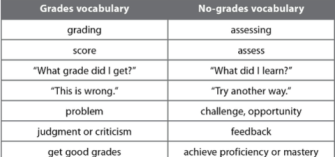
No matter how you approach it, assessment is one of the most essential parts of formal education. And this year’s reader interest shows that folks are really starting to question traditional practice as it pertains to grades in particular.
Whether we talk about the how or why of assessment, it always comes back to the communication of learning and different things that dilute that discussion.
Here are this year’s top posts, most centering around assessment:
- How Can Students Focus on Learning When Educators Only Care About Grades? - As education continues to shift, we need to evaluate the long-held systems in place. Grading teachers don’t make them more effective, constant conversations and snapshot observations will. We can only help improve educators if we take the time to get to know them. Admin, know your teachers. What are you waiting for?
- Create a Syllabus for High School Students - Isn’t it time we started teaching students to follow a syllabus to ensure better classroom success? Check this out to help you plan.
- Keep Students Accountable With Weekly Class Logs - Although running records and other in-class methods can be useful, they can often be tedious and superfluous. How many times do we actually go back to the records beyond the next day or two to really think about where students are and how we can better plan mini-lessons and feedback?
- 5 Points Off for Using Pen? - School must be a place where students feel stimulated and excited about learning new things, experimenting, and taking risks that stretch their thinking, not shut down by folks who feel the need to control them and how they think.
- Student Self-Assessment Practices That Work - The way it looks for various age groups will be different, as younger students are not always cognitively ready to do this kind of thinking. However, with the right scaffolds in place, reflection and self-assessment can be a productive way to extend the depth of independent learning and also aid in informing the teacher about valuable data on growth and understanding.
- Make School About Learning, Not About Grades - Classroom environments must be rich, adventure-producing, risk-promoting atmospheres that allow students to be naturally curious, ask sometimes unanswerable questions, and foster skills that seek new solutions.
- Traditional Grading Habits Drive Me Crazy - Grading is a deeply rooted tradition inside of most school systems and even more profoundly inside of most of the people who reside within them. Between the experiences they’ve had as students themselves and firmly-held beliefs about justice and equality among their students, many teachers have a hard time even conceptualizing letting go of numbers and letters associated with learning. Honestly, I’m not even sure how much they value these reasonably meaningless numbers and letters until someone tries to suggest they should be removed.
- Traditional Report Cards Are Obsolete - Communication about learning needs to be ongoing in a meaningful way, and paper report cards being mailed home or sent home with students or uploaded onto an online portal as a PDF a few times a year just doesn’t cut it.
Shifting the Grading Mindset Starts With Our Words - The traditional grading language is passive and judgmental, and by using this language, we are putting the focus on the wrong things.
When we say to each other or to kids that we are “grading,” it reduces the work that we are trying to do. What we are actually doing is “assessing” growth and understanding.- Changing the Way We Think About Assessment - When we think about assessment these days, we must look beyond the data and the standardized testing too often associated with the idea. Assessment is an opportunity for student empowerment and personal reflection and growth. Assessment is the way we know what kids know and can do and how we propel them to progress and growth.
Since assessment of some kind will always be a part of the educational process, we must make sure to be intentional in when, how, and why we assess students. Each decision we make should be transparently shared and aligned with the standards for students to demonstrate their level of mastery. As we continue to separate non-learning measures from the way we communicate learning, the better we will know what kids know and can do.
What did you learn about your assessment practices this year? Anything you tried that you’d like to share? Or anything you would like to try but haven’t yet? Please share.